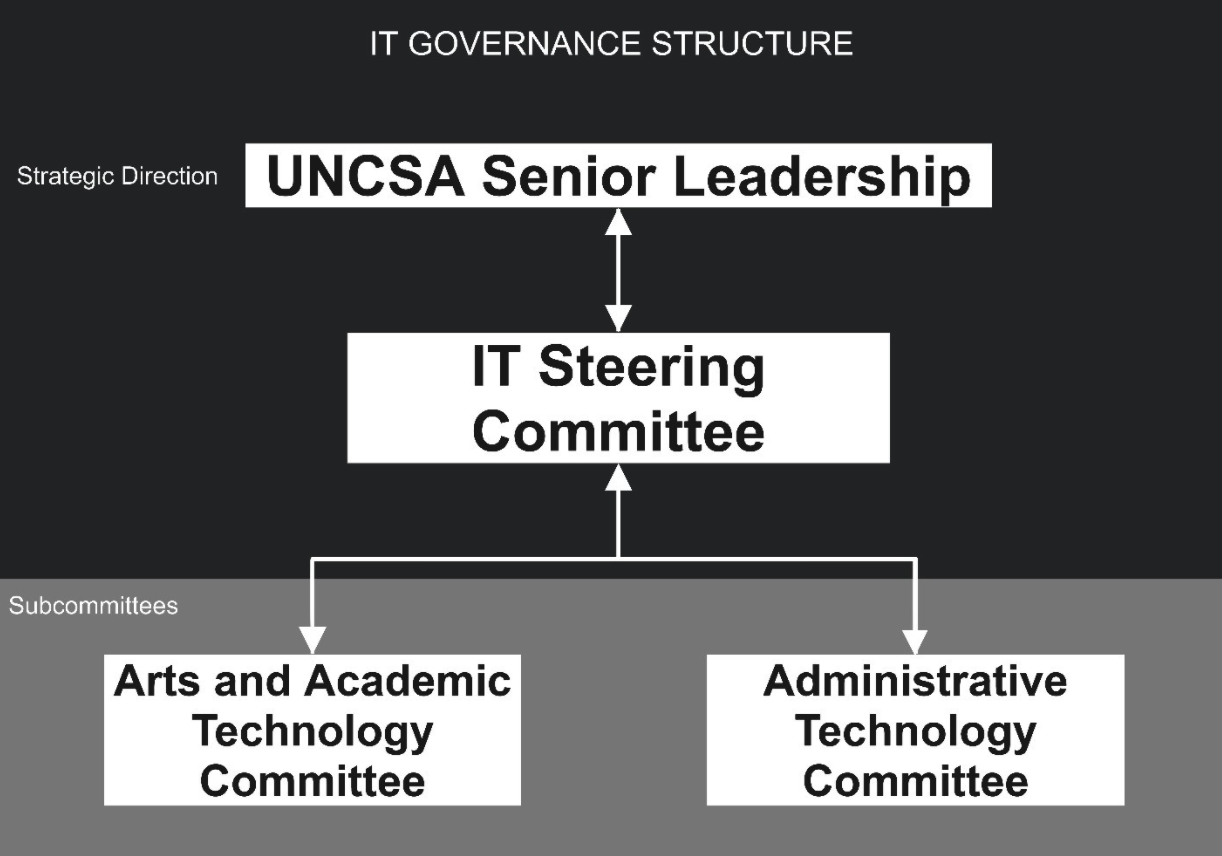IT Governance Program Charter
Establishment and Authority
University of North Carolina (UNC) System Policy 1400.1, Information Technology Governance, delegates and allocates authorities and responsibilities concerning information technology (IT) governance within the University of North Carolina System. Under this policy, the University of North Carolina School of the Arts (UNCSA) Chancellor has designated the Chief Information Officer (CIO) as responsible for oversight and implementation of the campus information technology governance program at UNCSA (UNC System Policy 1400.1, Section IV).
This charter defines the information technology governance framework, model, and operating principles for UNCSA in accordance with UNC System Policy 1400.1 and guidance provided by the UNC System.
Objectives
The purpose of the UNCSA information technology (IT) governance program is to:
- Establish technology prioritization and investment in alignment with UNCSA’s mission, institutional values, core strategies, and the institutional strategic plan.
- Ensure a holistic and strategic approach to governance and management of information technology services and assets across UNCSA through consistent, effective communication and collaboration.
- Promote a culture of innovation to enhance learning experiences, educational programs, and interdisciplinary work in the arts.
- Create comprehensive, institution-wide regulations, standards, guidelines, and procedures within the formal IT governance structure to reduce institutional risk.
The UNCSA IT governance program allows UNCSA’s Division of Information Technology—in collaboration with departments and schools—to support the most important initiatives of UNCSA while improving the transparency and accountability of technology operations across campus. This shared governance model provides campus IT operations with a framework to comprehensively support transformational initiatives that are technologically sustainable and that promote efficiency and equitability.
Principles
The UNCSA IT governance program is guided by the following principles:
- Align technology decisions, project prioritization, and resources across UNCSA in a transparent and consistent manner.
- Prioritize campus-wide integrations that strengthen the interconnectedness of systems and help improve the campus community’s daily work lives.
- Support data management and integrated data goals for the campus that will empower data-driven decision-making across UNCSA.
- Grow collaboration with external organizations to extend the mission of UNCSA and help maintain or expand industry relevance.
- Leverage the buying power of the UNC System.
- Encourage the ethical and equitable use of technology solutions/tools and services that will support UNCSA’s Equity, Diversity, Inclusion, and Belonging (EDIB) vision and help improve the university’s actions and outcomes, including access and success, capacity building, cultural intelligence, and support and advocacy.
Roles and Responsibilities
UNC President. The UNC president is responsible for oversight of the information technology governance program applicable to the UNC System and its constituent institutions.
UNC System Chief Information Officer. The UNC System’s chief information officer is responsible for developing guidance for the UNC System’s information technology governance program in conjunction with the UNC System Chief Information Officers Council.
UNC System Chief Information Officers Council (CIOC). The CIOC is the leadership body for UNC IT Governance and works with the UNC System chief information officer to collaborate on IT governance activities. In addition, the CIOC is responsible for guiding constituent institutions on IT governance activities and for encouraging collaboration and shared service arrangements in areas of information technology management across constituent institutions.
UNCSA Board of Trustees. The UNCSA Board of Trustees shall assign responsibility for oversight of IT governance to a standing committee of the board with audit responsibility and carry out the activities specified in UNC System Policy 1400.1, Section V. The board Audit, Risk, and Compliance Committee has been charged with this responsibility.
UNCSA Chancellor. The UNCSA Chancellor is required to designate their institution’s chief information officer or another member of the chancellor’s senior staff as responsible for oversight and implementation of information technology governance at the institution (UNC System Policy 1400.1, Section IV). In addition, the Chancellor and Chancellor’s Cabinet shall be responsible for:
- Approving this IT governance program charter.
- Providing executive oversight and support of the IT governance program.
- Providing guidance concerning university risk tolerance levels.
- Providing resources to meet approved IT governance program objectives.
UNCSA Chief Information Officer (CIO). The CIO is responsible for overseeing the creation and implementation of the information technology governance program at UNCSA. In addition, the CIO is responsible for:
- Monitoring the effectiveness of the IT governance program.
- Maintaining alignment of campus information technology operations with university risk tolerance levels.
- Periodically reporting on IT governance activities to the Chancellor and Chancellor’s Cabinet and to the Board of Trustees Committee on Risk Management, Audit, and Compliance.
- Forming and charging standing and ad hoc committees as necessary to achieve IT governance objectives.
Governance Structure and Committees
The UNCSA IT governance program, through its structures and committees, shall meet the requirements of UNC System Policy 1400.1 and provide a framework for the effective governance of all IT at UNCSA, including central and distributed IT, and ensure that the framework grants CIO access to senior leadership.
UNCSA uses the following structure and committees to achieve these objectives:
- Information Technology Steering Committee
- Arts and Academic Technology Subcommittee
- Administrative Technology Subcommittee
Information Technology Steering Committee
The Information Technology Steering Committee serves as the governing body for IT governance activities at UNCSA. The purpose of the Steering Committee is to facilitate IT alignment with the central mission of the university through an IT strategic plan, roadmap, and IT investments in collaboration with technology advisory subcommittees listed below. The work of the committee helps to ensure a holistic, cost-effective, transparent, and strategic approach to prioritizing university technology resources and investments in support of the institution’s mission and priorities. The steering committee is comprised of senior executives and at least one committee chairperson from each of the IT governance standing committees. As the committee co-chair, the CIO has primary responsibility for reaching consensus, reporting, and implementation of committee recommendations. Additional information about the purpose and operation of this committee is defined in the committee’s charter.
Arts and Academic Technology Committee
The Arts and Academic Technology Committee guides decision making for arts and academic technology services. The goal of this committee is to bring together academic units to understand relevant technology needs and capitalize on opportunities for efficiencies in decisions about educational technology use and support. The work of the committee helps to ensure a cost-effective, transparent, and strategic approach to prioritizing resources, projects, and investments in support of the institution’s academic mission, values, and core strategies. Additional information about the purpose and operation of this committee is defined in the committee’s charter.
Administrative Technology Committee
The Administrative Technology Committee provides advice and recommendations in support of the mission of UNCSA’s administrative technology services. The goal of this committee is to bring together departments to provide a comprehensive view of administrative technology needs and coordinate the effective use of technology resources. The work of the committee helps to ensure a cost-effective, transparent, and strategic approach to prioritizing resources, projects, and investments in support of the institution’s administrative mission, values, and core strategies. Additional information about the purpose and operation of this committee is defined in the committee’s charter.
The model below is a visual depiction of the UNCSA IT Governance framework and committee structure. The model is not a reporting model. IT governance subcommittee membership will be shared among faculty, staff, and other stakeholders.

Program Metrics
A set of program metrics will be developed by the IT Steering Committee and used to determine the overall success and continual improvement of IT governance activities. Each additional governance committee is responsible for developing metrics to demonstrate the success of that committee’s activities.
Program Plan, Reporting, Review, and Renewal
IT governance will follow an implementation cycle that supports increasing maturity in IT governance through annual plans based on maturity models. The continuous cycle of program activities supports a process of
- actively designing an IT governance program,
- implementing committees as necessary,
- creating and approving an annual plan and budget,
- regular assessment and analysis of program activities,
- planning for program improvements, and
- regular reporting to the UNCSA Chancellor and Board of Trustees.
References
- UNC System Policy 1400.1 Information Technology Governance
- UNC System Policy 1400.2 Information Security
- IT Governance Program Charter University of North Carolina System
- 2020 UNC CIO Council Strategic Plan
Document History
|
Date |
Change |
|
2/15/2022 |
Program charter approved by Brian Cole, UNCSA Chancellor |





